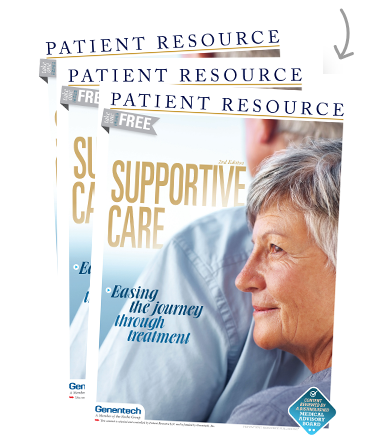High Calcium Levels (Hypercalcemia)
Manage high calcium levels in your blood
Calcium, in normal levels, strengthens the bones and teeth, helps the blood clot, and helps the heart, nerves and muscles function. While most calcium is found in the bones, some is found in the blood. Hypercalcemia is a condition in which there is too much calcium in the blood. The kidneys, bones and hormones (parathyroid and calcitriol) regulate the amount of calcium in the blood, and if any of these regulatory agents go awry, hypercalcemia can result.
Hypercalcemia is the most common life-threatening side effect of cancer, affecting 10 to 20 percent of adult patients. Hypercalcemia affects the entire body, and if left untreated, it can result in a coma or even death. Therefore, catching and treating it early is vital.
What causes hypercalcemia?
Certain types of cancer can cause hypercalcemia by interrupting normal kidney function and causing the kidneys to filter extra calcium back into the blood instead of passing it out of the body via urine. Various hormone therapies and biologic therapies (including interleukins, growth factors and tumor necrosis factors) used to treat cancer can also cause hypercalcemia by disrupting the body’s calcium-regulating hormones. In addition, general inactivity can cause hypercalcemia because when bones aren’t used, they release calcium into the blood.
Who is at risk for hypercalcemia?
People with certain types of advanced-stage cancers, including breast cancer, lung cancer, multiple myeloma, lymphoma and other blood cancers, are at an increased risk for developing hypercalcemia, as are cancer patients treated with certain hormone or biologic therapies. People with hyperthyroidism (an overactive thyroid), hyperparathyroidism (an overproduction of the parathyroid hormone), kidney failure, inherited kidney conditions and/or inherited metabolic conditions also have a greater chance for hypercalcemia. Additionally, people who are inactive for a long period of time or who have excessive vitamin D levels may be at an increased risk.
When does hypercalcemia occur?
When hypercalcemia occurs largely depends on the cause. Cancer-related hypercalcemia can develop at any point before or during treatment. It typically resolves as the cancer is treated; however, if your cancer is very advanced, it may not be possible to permanently control your hypercalcemia.
Hypercalcemia caused by cancer treatment usually begins to develop soon after the treatment starts. Blood calcium levels will often return to normal within a few days after the hypercalcemia is detected and managed.
How is hypercalcemia managed?
Hypercalcemia can range from mild to severe. Patients with mild hypercalcemia (no symptoms) are typically treated by receiving extra fluids, usually intravenously (through an IV), and are encouraged to become more active. Patients with moderate to severe hypercalcemia are typically treated using one of more of the following approaches:
- Replacing lost fluids
- Increasing activity
- Receiving treatment for the cancer that’s causing the hypercalcemia
- Receiving medications, such as bisphosphonates, to stop the breakdown of bone, which will in turn stop the release of calcium into the blood
- Receiving steroid medications
- Receiving medications to control fever, nausea and vomiting
- Beginning dialysis (in patients with kidney failure)
You may be hospitalized for one or more days during treatment for hypercalcemia. The treatment is considered successful if it alleviates your symptoms and decreases your blood’s calcium level. Once your calcium level is normalized, your doctor will continue to collect urine and blood samples to monitor your status.
When should I talk to my doctor about hypercalcemia?
When you’re diagnosed, ask your doctor if your specific cancer type is likely to cause hypercalcemia. Similarly, ask your doctor if any elements of your treatment plan will increase your risk for hypercalcemia. Throughout treatment, you should also tell your doctor if you experience any of the common symptoms of hypercalcemia so management can begin right away.
Common symptoms of hypercalcemia
- Weakness and/or fatigue
- Headaches
- Confusion
- Hallucinations
- Change in personality
- Difficulty thinking and/or talking
- Slowed or lost reflexes
- Nausea and/or vomiting
- Loss of appetite
- Dehydration and increased thirst
- Dry mouth
- Increased urination
- Dark-yellow urine
- Constipation
- Poor skin elasticity
- Irregular heartbeat
- Kidney stones
- Bone pain
Tips for preventing hypercalcemia
- Drink as many fluids as your doctor recommends to flush out excess calcium.
- Ask your doctor about increasing your salt intake to encourage your kidneys to excrete more salt and calcium.
- Keep fevers, nausea and vomiting in check because they can lead to dehydration.
- Remain active to keep your bones in motion.
- Talk to your doctor about the medications you’re taking, as some may make hypercalcemia worse.



